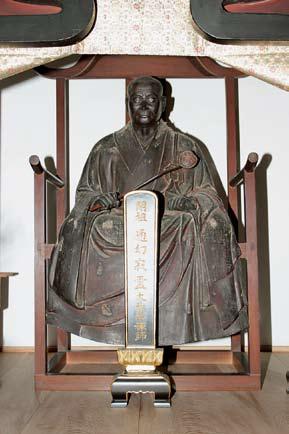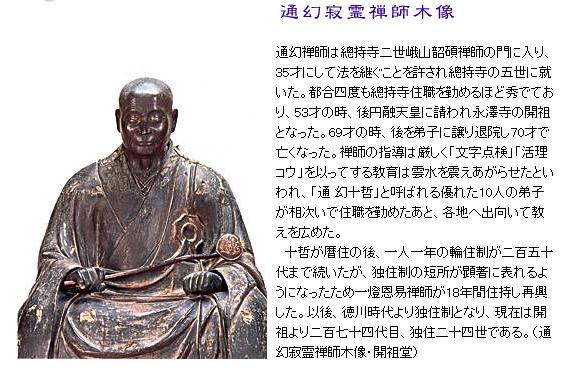ZEN MESTEREK ZEN MASTERS
« Zen főoldal
« vissza a Terebess Online nyitólapjára

通幻寂霊 Tsūgen Jakurei (1322-1391)

通幻寂霊 Tsūgen Jakurei (1322 - May 5, 1391) was a Japanese Zen monk and poet, known as one of the main disciples of Gasan.
The Sōtō Sect (曹洞宗) was spread through all of Japan by Meihō Sotetsu (明峰素哲, 1277~1350) and Gasan Jōseki (峨山韶碩, 1276~1366), pupils of Keizan Jōkin (瑩山紹瑾, 1268~1325). Among Gasan Jōseki's followers, Taigen Sōshin (太源宗真, ?~1371), Tsūgen Jakurei (通幻寂霊, 1322~1391), Mutan Sokan (無端祖環, ?~1387), Daitetsu Sōryō (大徹宗令, 1333~1408) and Jippō Ryōshū (実峰良秀, ?~1405), developed Sōjiji (総持寺) in Noto (能登) as a home base.
T2592 通幻靈禪師漫錄
http://21dzk.l.u-tokyo.ac.jp/SAT/ddb-sat2.php?mode=detail&useid=2592_
Quotes about Tsugen Jakurei
https://en.wikiquote.org/wiki/Tsugen_Jakurei
• Tsugen Jakurei (1322-1391), whose teaching was most widely inherited in the Soto sect, is famous for his 'pit of burying-alive'. When an itinerant priest came to him in order to receive training, it was said, he tested the newcomer and if he perceived in the latter any impurity of motivation, he then simply threw him down into the pit.
Hajime Nakamura, The Ways of Thinking of Eastern Peoples, 1960/1991. p. 412
• Tsugen Jakurei (1322-1391) is the best known of the five chief disciples of Gasan. Highly gifted, he read the Buddhist sutras as a young boy and at seventeen decided to be a monk. He took his first steps in the monastic life in his native Kyushu, but soon traveled north to present himself before the doors of Daijo-ji in Kaga, where Meiho Sotetsu received him warmly. Tsugen, a determined searcher of the Way, carried on his practice continually by day and by night and elicited the admiration and wonder not only of his fellow monks but also of the surrounding population. After more than ten years at Daijo-ji, he moved to Soji-ji in 1352, hoping that Gasan's direction would bring his progress along the path of enlightenment to completion. In 1356 he had an experience of the great enlightenment at Soji-ji.
Heinrich Dumoulin, James W. Heisig, Paul F. Knitter. Zen Buddhism: a history. 1989. p. 210
DOC: Sōtō Zen in Medieval Japan
by William M. Bodiford
Kuroda Institute Studies in East Asian Buddhism 8. Honolulu: University of Hawai‘i Press, 1993, 368 p.
Jakurei of Yotaku
from Biographical Extracts of the Original Stream
compiled by zen master 月坡道印 Geppa Dōin (1637-1716)
Translated by Thomas Cleary
In: Timeless Spring, A Soto Zen Anthology,
Weatherhill / Wheelwright Press, Tokyo - New York, 1980, pp. 140-141.
The zen master's initiatory name was Jakurei; he wa s
styled Tsugen. He was from Kyoto. He was orphaned as a
child and was raised by his grandmother. He saw that he
was physically unfit for worldly occupations, and climbed
Mount Hiei to have his head shaved. His mind and appear-
ance were outstanding and brilliant; he could understand
scriptures at a glance. He deeply cultivated and refined the
teachings (of Tendai buddhism) of cessation and insight
He had some doubt and set his mind on that which is
beyond the teachings; so he left (Hiei) and called on zen
master Gazan at Soji.Gazan asked, "Where have you come from?" He said,
"Mount Hiei." Gazan said, "What do you seek?" He said,
"I have doubted the teaching of cessation and insight for a
long time." Gazan said, "Don't indulge in imagination!"
Tsugen's feeling of doubt flared up all the more, to the
point where he forgot about eating and sleeping. Gazan
knew he was a vessel of Dharrna. and questioned him
closely about the saying about shedding body and mind.One morning the master Tsugen was suddenly en-
lightened and said, "Old teacher, don't fool people!"
Gazan said, "What truth have you seen?" He said, "Riding
backwards on the buddha shrine, going out the main
gate." Gazan agreed with this. After that Tsugen studied
with Gazan for a very long time and understood all the
stories of past and present.When the master Tsugen received the robe symbolizing
the faith, he expounded the teaching at Yotaku and
Ryusen monasteries; his fame in the way was honored
beyond the seas, and crowds of people came and went
ceaselessly. At that time the emperor Goenju of the Oan
era sent down an edict granting Tsugen authority over the
whole school throughout the land; because of this, the
standards of Soto zen were strict everywhere.The master was most high minded and didn't speak
with people . He always stayed in one room and forgot all
about society. One day he had a slight illness; he rang the
bell and told the assembly, then admonished them,
"People, you should end all entanglements and concentrate
on understanding your own affair. On the other side,
throwaway useless words and letters; on this side, slough
off evanescent honor and profit - wherever you are, be
clean and free and you may be true seedlings of the To
succession. Otherwise, you are not my disciples."He asked for a brush and wrote a verse saying,
Coming and going in this world,
A full seventy years;
Here where I turn around,
My feet tread upon the heavens.Having written this, he died sitting peacefully.
TSUGEN JAKUREI
Died on the fifth day of the fifth month, 1391 at the age of seventy
From the day of my coming hither
Full seventy years have passed.
Now, setting out on my final path
My two legs trample the sky.
In: JAPANESE DEATH POEMS
Written by Zen Monks and Haiku Poets on the Verge of Death
compiled with an Introduction and commentary by Yoel Hoffmann
Rutland, Vermont, Charles E. Tuttle Publishing, 1986
![]()
TSUGEN JAKUREI
Meghalt 1391-ben, az ötödik hónap 5. napján, 70 évesen.
Somogyvári Zsolt fordítása
In: Jisei: Zen-szerzetesek és haiku költők versei a halál mezsgyéjéről
Farkas Lőrinc Imre Kiadó, 1994, 32. oldal
Elmúlt érkezésem napjától ezidáig
Teljes hetven év.
Most, utolsó ösvényemre lépve
Az eget tapodja két lábam.
遺偈 (辞世の句)
「甲子を算計するに満七十年。末後の一句。両脚天を踏む」
Tsūgen Jakurei búcsúverse
Terebess Gábor fordítása:
Az evilági jövés-menés
Kerek hetven évembe telt
Már fel is fordulhatok mostan
Az eget lábbal hadd tapossam